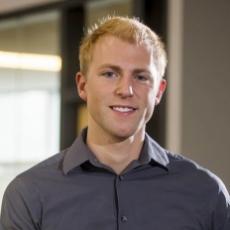Tyson Gersh is thinking big.
As co-founder of the Michigan Urban Farming Initiative (MUFI), he’s ready to tackle socioeconomic disparity—one parcel of vacant land at a time.
The idea began when Tyson worked in Detroit as a research assistant to the Urban Community Oral Health Project. As he interviewed more than 200 women who relied on the services of the WIC program, he started to see the relationship between socioeconomic status and food security.
“It became clear to me that food security was a necessary requisite in enabling upward social mobility,” he said. “People need to have physical and economic access to quality food and the education to recognize its value as a staple in their diet.”
Tyson knew that food security and the vast amount of vacant land in Detroit posed significant challenges to the rejuvenation of the city. But he also saw those challenges as an opportunity for change.
“By reframing agriculture as a platform to promote education, sustainability and community, while simultaneously reducing socioeconomic disparity, we can work to empower urban communities,” he said.
So Tyson co-founded MUFI in December 2011, purchasing a building in the North End community of Detroit surrounded by vacant land.
They hoped to work together with local residents to develop the property into a community resource center, a demonstration urban farm and a community garden.
In the summer of 2012, MUFI hosted more than 20 volunteer workdays, engaging more than 800 volunteers.
The result? The land transformed: a pumpkin and squash patch, raised garden beds of tomatoes, peppers and sunflower seeds, and the beginning remediation of contaminated soil.
MUFI is now a registered 501 (C)(3) non-profit organization, partnering with the community and volunteers and beginning to remodel the standing building.
“Tyson is a truly exceptional student who has taken his passion for bettering his community to the heights of civic engagement and involvement,” said Jonathan Larson, coordinator of LGBTQ and inclusion initiatives.
For Tyson, his work all goes back to the big picture.
“I commit to organizing efforts that address structural inequality and promote equity across socioeconomic strata,” he said. “Think globally; act locally!”


